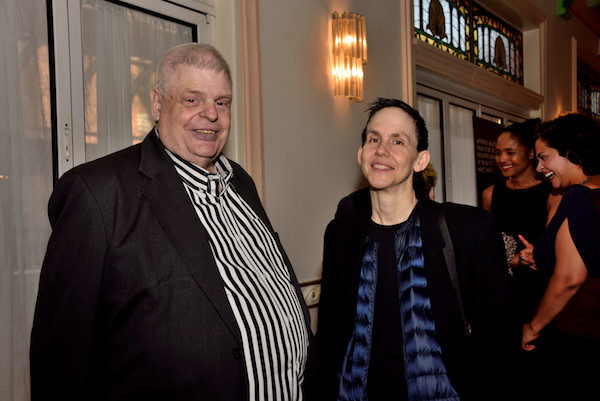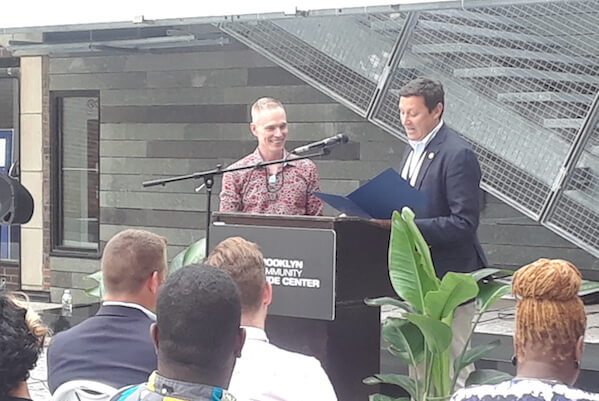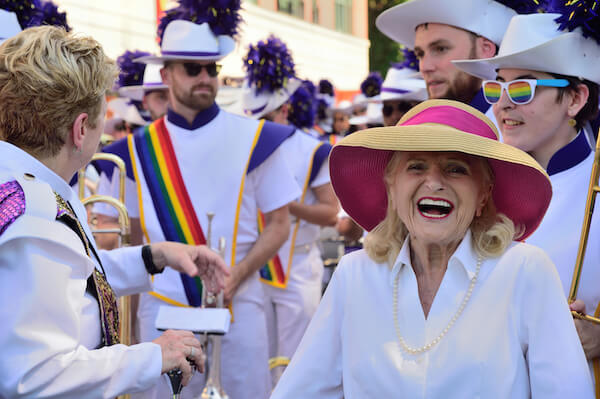Demonstrators called out Mayor Bill de Blasio over the city's widely panned handling of the Chelsea STD clinic closing. | GAY CITY NEWS
BY DUNCAN OSBORNE | During a protest outside City Hall, some 30 members of ACT UP New York called on the de Blasio administration to replace the HIV and sexually transmitted disease testing services that were lost when the city closed its Chelsea sexually transmitted disease clinic for a two-year-long renovation.
“This city government cannot ignore the health, the public health, of the queer community,” said James Krellenstein, a member of the AIDS activist group, during the June 3 protest.
The clinic, one of nine the city health department operates, closed on March 21 for a $17 million renovation of the nearly 80-year-old building. The Chelsea clinic reported the most annual visits among the nine clinics. The health department has been criticized for either not planning to replace the lost services or for poor planning.
ACT UP demonstrators charge city “pulling numbers out of the air” about ability to pick up STD screening slack
Those services are vital because Chelsea and Hell’s Kitchen have the highest rate of syphilis infections in the city. The syphilis epidemic, as activists are calling it, has gone unabated since 2007. Chelsea and Hell’s Kitchen also have the highest rate of new HIV diagnoses in the city. The syphilis and HIV rates in those neighborhoods result almost entirely from new infections among gay and bisexual men. The two neighborhoods also have high rates of gonorrhea and hepatitis C.
The Chelsea clinic was also expected to be an important resource in the Plan to End AIDS that aims to reduce HIV infections in New York State from roughly 3,000 annually to 750 a year by 2020. People who have a recent sexually transmitted disease may be at high risk for acquiring HIV. Such people could be candidates for pre-exposure prophylaxis (PrEP), the consistent use of anti-HIV drugs by HIV-negative people to keep them uninfected.
“The hardest part is getting the highest risk population,” Krellenstein said. “They have the goldmine here.”
The health department has floated various proposals for replacing the lost services, with the most recent coming the night before the protest. In an email to City Councilmember Corey Johnson, who represents Chelsea and chairs the Health Commmittee, Dr. Mary Bassett, the city’s health commissioner, proposed steering clients to three nearby nonprofits, placing testing vans operated by six nonprofits outside the clinic, and adding a permanent city testing van. Altogether, this would cover 23,000 annual visits, according to Bassett. Since 2012, the Chelsea clinic had roughly 20,000 visits every year. The city will also expand and modernize its testing and lab facilities in its permanent van.
In the city's original proposal, the six vans were to be at the clinic through September. It is not clear that the three nonprofits have the capacity to add thousands of new visits annually, though one of them, the Callen-Lorde Community Health Center, has already added 105 sexual health visits to its weekly schedule, or just over 5,400 every year.
“They suddenly have told us that these clinics will be able to do 15,000 visits a year,” said Jim Eigo, an ACT UP member. “I’m afraid the [health department] is just pulling numbers out of the air.”
The Chelsea clinic testing was also free and could be anonymous. Those services are harder to find at private nonprofits. Activists want to see sufficient cash allocated to fund “expanded HIV/ STD testing and treatment at neighborhood clinics,” an “inexpensive, prefabricated temporary clinic” at the Chelsea site, “funds to expedite the renovations of the shuttered clinic,” and a community board to oversee the renovation.
The June 3 protest aimed particular fire at the mayor. | GAY CITY NEWS
While earlier complaints focused on the city health department, the June 3 protest aimed some of the frustration and anger at Mayor Bill de Blasio. Some signs read “De Blasio, the blood is on your hands,” “De Blasio, blasé on STDs,” and “Mr. Mayor: You make us sick.”
A June 3 visit to the closed Chelsea clinic showed that asbestos abatement has begun at the site, but also revealed that people continue to go there expecting the clinic to be open.
A city health department employee who was stationed there to send people to another city clinic on West 100th Street or to the nearby private providers told Gay City News that she had spoken with 20 people seeking services that day.
Staff from the AIDS group Harlem United, which had its mobile health van parked outside the clinic on June 3, said they saw about 10 people for sexually transmitted disease screening and three for primary health screening.
Data that was distributed at a May 15 meeting of activists and senior health department staff suggests that visits to city clinics are down generally through mid-April. The data also suggest the decline is attributable to the Chelsea clinic closing. Syphilis diagnoses also appear to have declined since the Chelsea clinic closed.




































